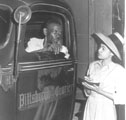






The
Black Press: Soldiers Without Swords The
Black Press: Soldiers Without Swords is the first film to chronicle
the history of the black press - and its central role in the construction
of modern African American identity. It recounts the largely forgotten
stories of generations of black journalists who risked life and livelihood
so African Americans could represent themselves in their own words and
images. The
Black Press: Soldiers Without Swords is the first film to chronicle
the history of the black press - and its central role in the construction
of modern African American identity. It recounts the largely forgotten
stories of generations of black journalists who risked life and livelihood
so African Americans could represent themselves in their own words and
images. The Black Press takes viewers "behind the veil" of segregation to recover a distinctly black perspective on key events from antebellum America to the Civil Rights Movement. It offers an intimate social history of African American life during these turbulent years - the achievements trumpeted, defeats pondered, celebrities admired, even the products advertized. From the founding of the first black newspaper, Freedom's Journal, in 1827, black abolitionists like Frederick Douglass recognized the press as a powerful weapon against the enforced silence of slavery. This tradition of crusading journalism was carried on by pioneering scribes like Ida B. Wells, one of the first female newspaper owners in America and a leader in the fight against lynchings and Jim Crow. Robert S. Abbott built the Chicago Defender into the most powerful and successful black-owned newspaper of all time and is often credited with inspiring the Great Migration of African Americans from the South to the Northern cities. The Black Press goes on to contrast mainstream coverage of World War II with the nearly forgotten "Double V" campaign spearheaded by the Pittsburgh Courier. Black newspapers, linking the struggle against fascism abroad to segregation at home, terrified J. Edgar Hoover into trying to indict them for sedition, and helped lay the groundwork for the Civil Rights Movement to come. Charlotta Bass, editor and publisher of the California Eagle for 40 years, ran for Vice President on the Progressive Party ticket in 1952, the first African American to run for national office. Ironically, the black press in a sense became a victim of the success of the very movements it nurtured. During the Civil Rights struggles and urban insurrections of the '60s, white-owned papers at last began to hire African American journalists and even compete for black readership. The film asks if integration into the mainstream media has left many communities bereft of a committed black journalistic presence. The Black Press commemorates an heroic and indispensable chapter in the on-going struggle for a diverse and democratic media. It demonstrates that the written word has been as fundamental as music or religion in the evolution of African American consciousness. And it will convince students that it is as important today as in the past for black media professionals to play a vigorous role not just in print media but in the rapidly evolving information technologies of the future. |
WINNER: Producer:
Stanley Nelson Free CD-ROM accompanies purchase (includes Facilitator Guide) Video Purchase:
$195 |